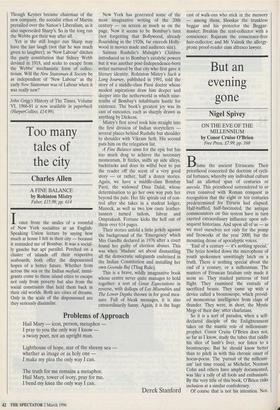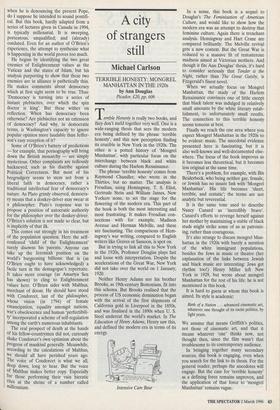But an evening gone
Nigel Spivey
ON THE EVE OF THE MILLENNIUM by Conor Cruise O'Brien Free Press, £7.99, pp. 168 Blame the ancient Etruscans. Their priesthood concocted the doctrine of cycli- cal fortunes, whereby any individual culture had an allotted span of centuries or saecula. This priesthood surrendered to or even connived with Roman conquest in recognition that the eight or ten centuries predetermined for Etruria had elapsed. Half-baffled, half-fascinated, the antique commentators on this system have in turn exerted extraordinary influence upon sub- sequent historians. And upon all of us — as we steel ourselves not only for the pomp and fireworks of the year 2000, but the mounting drone of apocalyptic voices.
`End of a century — it's nothing special.' The lyrics howled down the microphone of youth spokesmen unwittingly latch on a truth. There is nothing special about the end of a century, or a millennium. The masters of Etruscan fatalism only made it seem so. They studied patterns of bird flight. They examined the entrails of sacrificed beasts. They came up with a device called a brontoscope, which provid- ed momentous intelligence from claps of thunder. They were, in short, the Mystic Megs of their day: utter charlatans.
So it is a sort of paradox, when a self- declared disciple of the Enlightenment takes on the mantic role of millennium- prophet. Conor Cruise O'Brien does not, so far as I know, study the tubes that riddle his slice of lamb's liver, nor listen to a brontoscope. But he should know better than to pitch in with this chronic onset of hocus-pocus. The 'pursuit of the millenni- um' last time round, as Michelet, Norman Cohn and others have amply documented, was like a rally of all fools and enthusiasts. By the very title of this book, O'Brien risks inclusion at a similar confederacy.
Of course that is not his intention. Nor, when he is denouncing the present Pope, do I suppose he intended to sound pontifi- cal. But this book, hardly adapted from a series of lectures given in Canada in 1994, is typically millenarial. It is sweeping, portentous, unqualified; and (already) outdated. Even for an author of O'Brien's experience, the attempt to synthesise what is happening in the world proves too much.
He begins by identifying the two great enemies of Enlightenment values as the Vatican and the states of Islam, but his analysis purporting to show that these two enemies are in alliance is pathetically thin. He makes comments about democracy which at first sight seem to be true. Thus: `Democracy is turning into a series of instant plebiscites, over which the spin doctor is king'. But these wither on reflection. When has democracy been otherwise? Are plebiscites not an extension of democracy? And why, in democratic terms, is Washington's capacity to ignore popular opinion more laudable than Jeffer- son's easy reception of it?
Some of O'Brien's battery of predictions — for example, that pornography will bring down the British monarchy — are simply mysterious. Other complaints are tediously hackneyed, such as his diatribe against Political Correctness. But most of his bregrudgery seems to stem not from a liberal faith in democracy, rather a traditional intellectual fear of democracy's nature. As Plato grimly observed, democra- cy means that a donkey-driver may swear at a philosopher. Plato's response was to propose a position of autocratic authority for the philosopher over the donkey-driver. O'Brien's solution is not made so clear, but is implicitly of that ilk.
This comes out strongly in his treatment of the population question. Here the self- confessed 'child of the Enlightenment' surely disowns his parents. Anyone can take up the Jeremiah position on the world's burgeoning billions: that is (as O'Brien ought to have acknowledged) a facile turn in the demagogue's repertoire. It takes more courage (as Amartya Sen has shown) to cling to Enlightenment values here. O'Brien sides with Malthus, merchant of doom. He should have stood with Condorcet, last of the philosophes, whose vision (in 1794) of female emancipation, equality amongst nations, war's obsolescence and human 'perfectibili- ty' incorporated a scheme of self-regulation among the earth's numerous inhabitants.
The real prospect of death at the hands of his fellow-countrymen did not, curiously shake Condorcet's own optimism about the progress of mankind generally. Meanwhile, according to the calculations of Malthus, we should all have perished years ago. The voice of Condorcet is what we all, deep down, long to hear. But the voice of Malthus makes better copy. Especially for those performing their vain hieratic rites at the shrine of a number called



































































 Previous page
Previous page